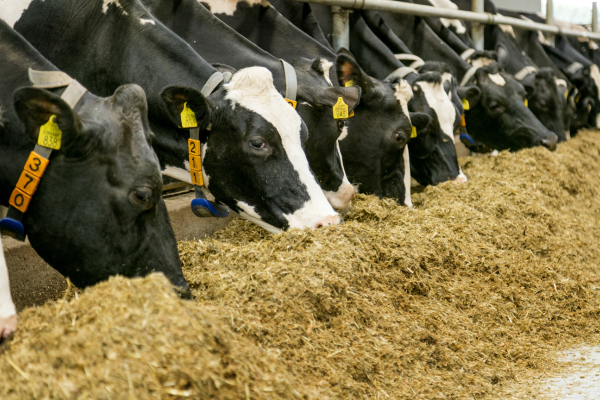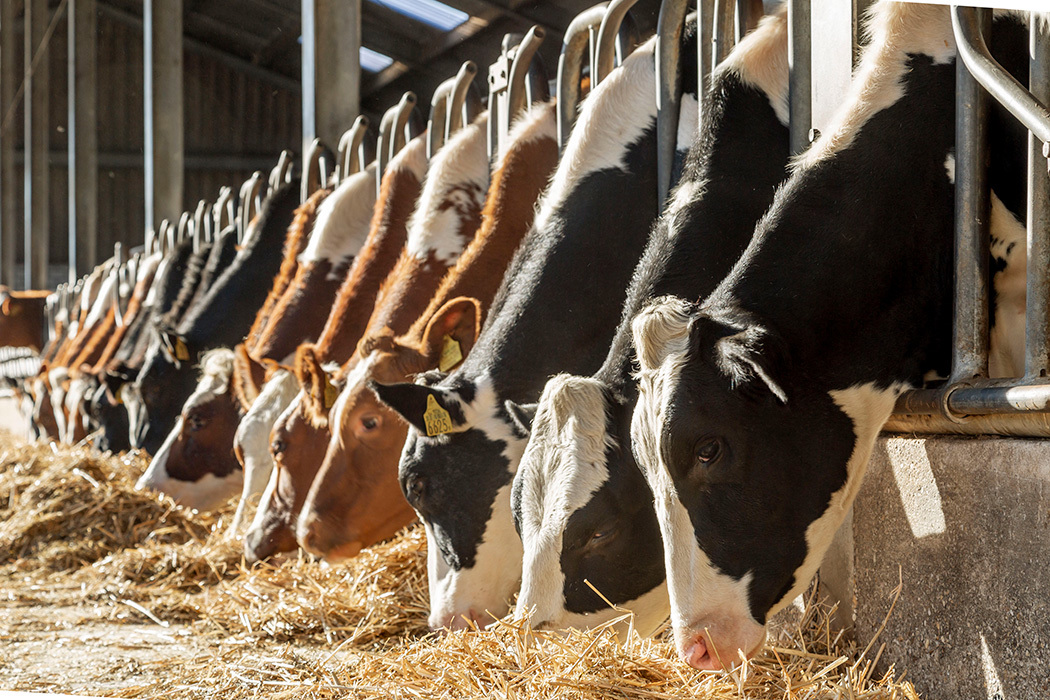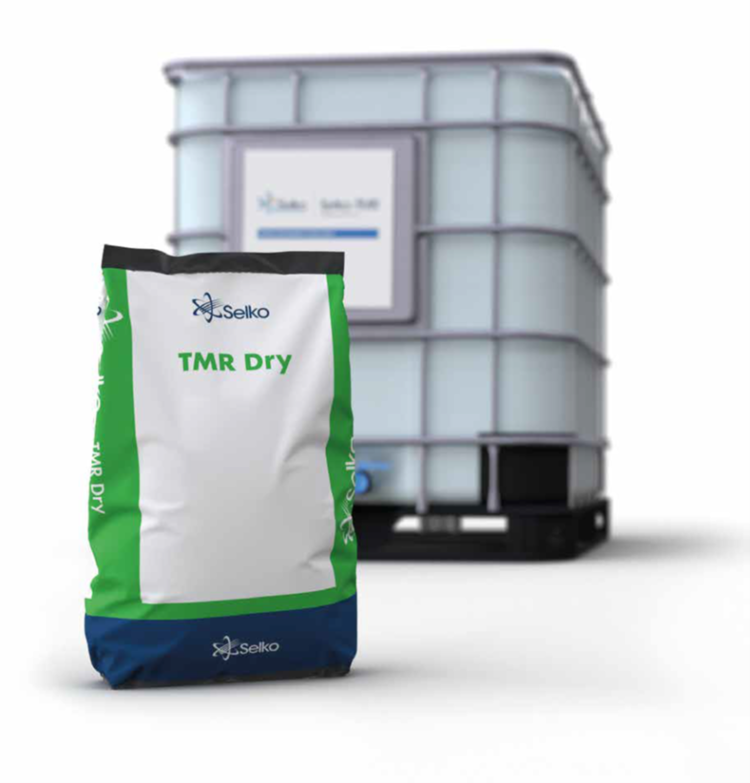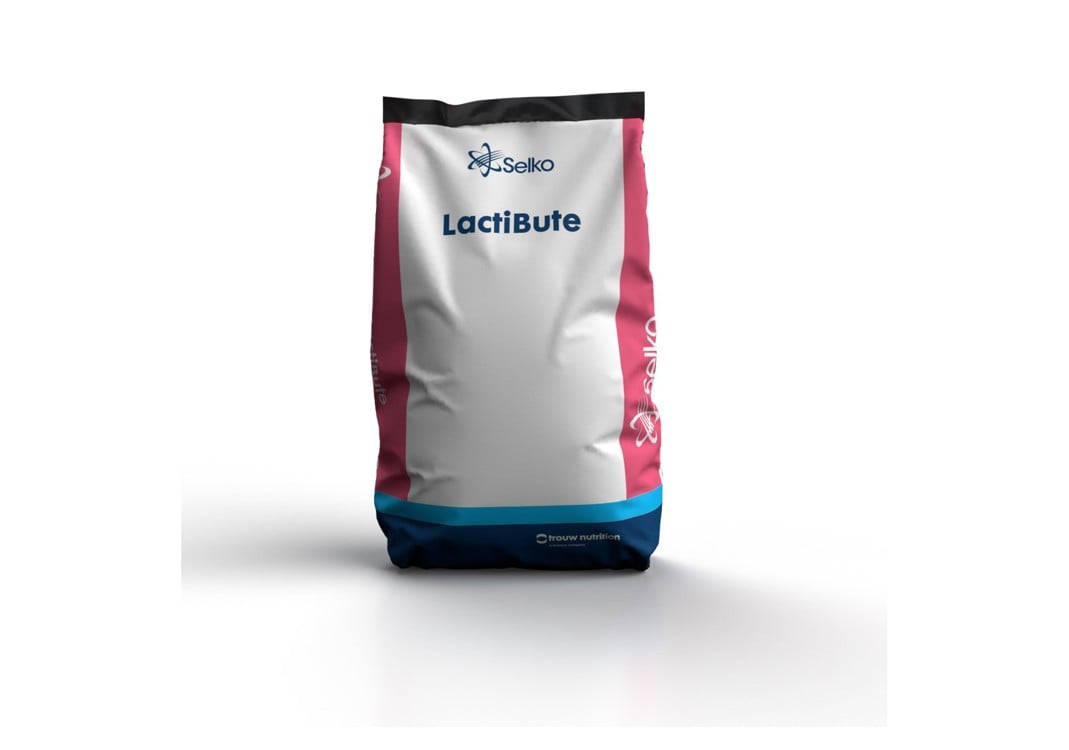

Adapting feeding times
During periods of heat stress, it’s best to feed twice per day. Feeding early in the morning and late in the afternoon can help reduce the heat load of the cow. Digestion will produce heat, which peaks at approximately three hours after feed consumption. By adapting the feeding schedule, the peak heat load from fermentation will occur earlier in the morning and later in the afternoon or evening at which times temperatures are lower than during the day.
Frequent push ups
Feed can quickly heat up and become stale or spoiled faster in hot weather. Regularly pushing up feed helps to keep it fresh for longer. Aim to push up feed at an increased frequency, at least 4-6 times a day during periods of heat stress. This frequency ensures that feed remains both appealing and easily accessible, which encourages consistent feed intake.
Increasing energy density
A key strategy to address heat stress in dairy cattle is adjusting the ration to increase energy density. One approach is to reduce the proportion of roughage in the diet and incorporate more compound feed or concentrates. Boosting the energy content of the diet can help offset the decrease in Dry Matter Intake (DMI) that often occurs during hot weather. Increasing the glucogenic energy content of the diet to over 185 grams per kilogram of DM can be beneficial. This adjustment aims to reduce heat production resulting from fermentation of fiber in the rumen.
It's important to note that reducing the amount of fiber in the diet may lead to an increase in protein fermentation, which can in turn raise heat production again. Additionally, feeding more concentrates can have adverse effects on rumen pH, potentially impacting the cow's digestive health. It's essential to strike the right balance in adjusting the diet to ensure optimal energy levels without compromising overall rumen health.
Maintain feed freshness
When feed sits in the bunk for extended periods, it can lose its freshness and become less appealing. Delivering fresh feed more frequently will ensure that the feed remains enticing, nutritious, and free from spoilage, thereby encouraging consistent feed intake. Take proactive measures to prevent the feed from heating up and deteriorating at the feeding fence due to microbial growth. It’s recommended to add substances like Selko-TMR, which inhibit the growth of molds, yeasts, and anaerobic bacteria. By doing so, you can maintain the freshness and quality of the feed, ensuring that your cows receive the nutrition they need without any negative effects.
Additionally, it's important to be aware that yeasts consuming the feed produce elevated levels of CO2. Cows are sensitive to these changes and can detect CO2, which may make them reluctant to eat. This reluctance can further reduce DMI, leading to potential decreases in milk production and overall health.
Nutritional strategies
During heat stress, dairy cows experience mineral losses, rumen imbalance, oxidative stress, and systemic inflammation. Supplementing electrolytes like sodium, potassium, and magnesium helps maintain hydration and acid-base balance, particularly when adjusting DCAD. Buffers such as sodium bicarbonate or yeast products support rumen pH and help prevent acidosis. Antioxidants like vitamin E, selenium, and plant polyphenols (AOMix) reduce oxidative damage, while gut health enhancers like Selko LactiBute support immune function and gut integrity. Together, these strategies protect cow health and sustain performance under heat stress.
Slightly moisten calves’ dry feed
For calves, dry mouth may negatively impact appetite. Calf muesli, concentrated feed and straw can be moistened slightly to make chewing and swallowing easier. Do make sure to dispose of the leftover feed early so that it does not spoil.
Stay ahead of heat stress
Receive valuable insights in your inbox
Ready to learn more about how to combat heat stress in your dairy herd over the course of the summer months? Fill out the form below with your first name, last name, and email address to receive valuable information and tips directly to your inbox. Stay ahead of the heat and keep your cows healthy and productive!



